GPBS TOKYO 2023 Report -The Latest Landscape of Corporate Pro Bono across the Globe-04/03/2024
The Latest Landscape of Corporate Pro Bono across the Globe
Thursday, November 30, 2023 13:30-16:00
Pro bono has spread in various forms around the world and is being introduced in many companies. This report, based on presentations at the Global Pro Bono Summit TOKYO 2023 corporate seminar held on 30 November 2023, provides practical knowledge such as points to keep in mind when introducing pro bono, tips for success and various perspectives for strategic introduction. Please take a look at the examples of pro bono practices of companies in various countries and the know-how of the intermediary organisations enabling pro bono activities in each contexts.
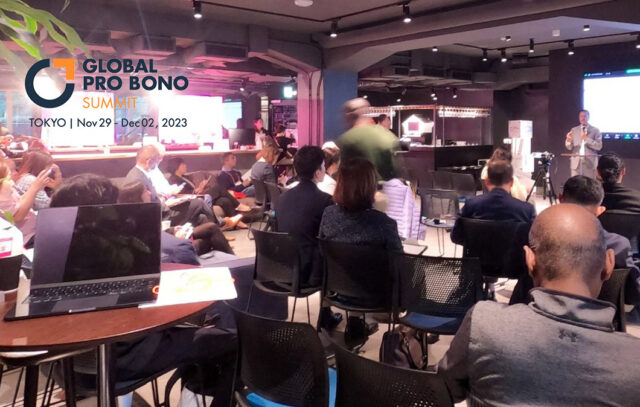
Venue: MIRAI LAB PALETTE( Otemachi, Tokyo) + Online
Table of Contents
Opening Remark
’Achieving the SDGs through Society 5.0 and the social contribution activities of Japanese companies’
Michiko Ikeda / General Manager, SDGs Division, KEIDANREN (Japan Business Federation)
Keynote 1
’Tips for the effective use of pro bono by companies to increase their value’
Markus Hipp / Board member, BMW Foundation Herbert Quandt, Germany
Keynote 2
’Various models and implementation techniques for embedding pro bono in corporate culture’
Lindsay Firestone Gruber, CEO, Taproot Foundation, USA
Introduction
’An introductory guide to getting companies started with pro bono work’.
Jumana Jamal / Ghadan Foundation, Saudi Arabia
Case Study
1. Commitment to ‘quality education’ through 100SEED
Miyuki Egusa / General Manager, CSR Management Team, Sustainability Promotion Department, Sumitomo Corporation
2. Global pro bono development in multinational companies
Maria Carracedo / Pro Bono Lab, France
3. Acceleration of pro bono work in Chinese companies.
Li Jing / Beijing Pro Bono Foundation, China
4. Pro bono work among young, mid-career and executive-level employees in Indian companies
Shalabh Sahai / iVolunteer, India
Opening Remark
‘Achieving the SDGs through Society 5.0 and the social contribution activities of Japanese companies’
Michiko Ikeda / General Manager, SDGs Division, Nippon Keidanren
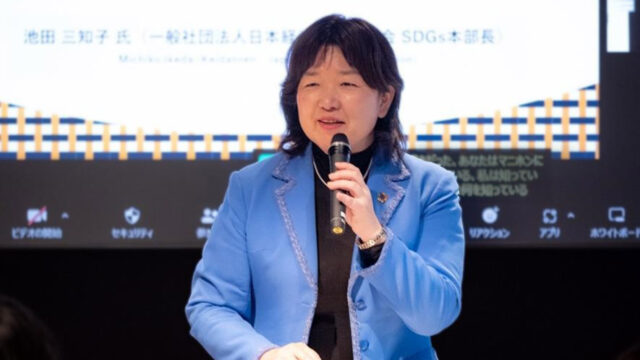
Keidanren is currently working on a growth strategy called ‘Society 5.0 for SDGs’ to realize a sustainable society and create the industries of the future. Society 5.0 for SDGs is a society where social issues are solved and value is created through a fusion of digital innovation, imagination and creativity by a diverse range of people. Keidanren has made this concept a pillar of its Charter of Corporate Behaviour and encourages companies to put it into practice in order to achieve the goals of the SDGs.
In addition to initiatives to solve social issues through business, Japanese companies are now also conducting social contribution activities by their employees. A survey conducted by Keidanren reveals that the idea of the role and significance of corporate social contribution activities as part of corporate social responsibility is widespread (83%). Also notable are the responses that consider it an opportunity for employees to grow through exposure to social issues (53%) and to increase employee motivation and strengthen their sense of belonging (45%).
Recent trends show that around 30% of companies do pro bono work. The Charter of Corporate Behaviour “Implementation Guide” also includes pro bono work as an example of specific initiatives. We believe that pro bono work is also extremely useful in terms of improving employees’ ability to identify issues and their sensitivity to social challenges. We hope that pro bono work will become more widespread in Japanese companies, and that many corporate people will be born who are committed to solving problems in order to realize a sustainable society.
Keynote 1
‘What are the tips for effective use of pro bono by companies and how to improve the value of your company?’
Markus Hipp, Board Member, BMW Foundation Herbert Quandt, Germany

The 17 goals of the SDGs are well known as one of the goals to make the world a better place. However, we now feel that their connection to the inner development of people involved in social action is missing, and the BMW Foundation continues to be involved in initiatives that promote the inner development of people. If companies want to incorporate pro bono with work, we believe the concept of Inner Development Goals (‘IDGs’) is very important.
The IDGs are the result of scientific research by university researchers and others from around the world that has identified the skills and qualities of inner human growth and development that are necessary to contribute to making the world a better place. The IDGs have identified the skills and qualities of inner human growth and development required to contribute to a better world.
The IDGs have five main goals: being, thinking, relating, collaborating, and acting. In addition, there are five sub-goals under each of these.
For example, having an inner compass of what contribution you can make when doing pro bono work will help to clarify the role you need to play. It also helps to have honesty and sincerity, openness and learning, self-awareness, and the ability to face the situation at hand. Being able to connect with different people and communities through social issues can inspire and motivate, and lead to mission realisation. These skills and qualities of the IDGs are enough to understand how pro bono can help a company and its contribution to society.
Businesses are now in a period of transformation. More than ever, companies must make a contribution to society. There are global divisions, divisiveness, wars, and climate change. I believe that companies can play an important role in society through the promotion of pro bono work.
If you want to change something, the most important thing is to have courage. Change is not easy, of course. With courage and vision, we can open up different opportunities. The result is change.
Keynote 2
‘A variety of models and implementation techniques to embed pro bono in corporate culture‘.
Lindsay Firestone Gruber, CEO, Taproot Foundation, USA
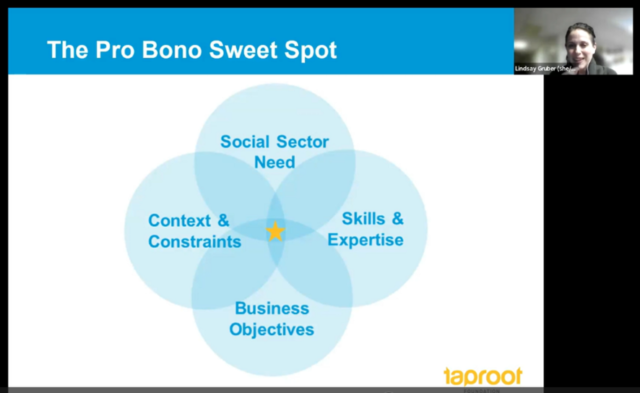
Since 2001, Taproot Foundation has delivered more than 150,000 people, 1.9 million hours and more than $290 million in value to the non-profit sector through pro bono consulting, working with more than 110 companies to design and build company-specific programmes that ultimately run themselves We design and build company-specific programmes that ultimately run and grow on their own.
In the United States, the non-profit sector is vital but is constantly under-resourced. Access to funding as well as certain types of expertise and resources is limited.
In general, studies show that in US companies, about 20% of costs are allocated to internal infrastructure investments, while non-profit organizations are only able to allocate 8.7%. In addition, during the Corona disaster, many non-profit organizations experienced a decrease in the number of staff and funding for their activities. However, demand has increased sharply. What we can do is provide pro bono support to help organizations increase their ability to fulfill their vital mission.
Intermediary organizations such as ours carefully develop their pro bono programmes to create a model that maximizes impact. Participating employees offer their own competencies and feel that they have made an overwhelming difference to the work of the non-profit organization, which also helps them to feel their own perspicacity. Goals that are too big or too small tend to fail. For example, it is difficult to reconcile engaging a large number of employees anyway with providing support through a specific skill set. Pro bono can help non-profit organizations to strengthen their foundations, develop leadership and foster a sense of togetherness by drawing on and maximizing the expertise of individual employees.
Non-profit organizations have diverse needs, but a particular need now is for assistance with marketing communications, social media strategy and financial reforecasting.
We, the pro bono intermediary organizations, have worked with a wide range of companies, seen examples and have a proven track record. We can focus on the needs that are most likely to create a significant impact and carefully model our programmes. And by using such intermediary organizations, companies can learn from the experience of other companies.
What are the needs of the non-profit organization, what are the skills and expertise of its employees, what are the goals the company wants to achieve? In programme design, we think realistically, with context and constraints in mind, and find the ‘sweet spot’ where these requirements overlap. This will result in programmes that are meaningful and impactful.
To increase the impact of programme design, it is important that companies understand these conditions. Above all, design programmes that focus on the needs of society.
Introduction
‘An introductory guide for corporations to get started with pro bono work’.
Jumana Jamal / Ghadan Foundation, Saudi Arabia

Ghadan has two offices in Saudi Arabia and works to strengthen the infrastructure in all sectors – government, individual and non-profit. In Saudi Arabia, it has set up a national volunteer platform, which currently has 615,000 registered volunteers. Of these, 20% do pro bono work. Another 16% of the population is involved in volunteering. Volunteering has three pillars: first, 99,000 healthcare professionals work in the healthcare sector as volunteers. Secondly, the Government has a Minister for Volunteering, and 16 ministers are involved in pro bono consultancy activities during the year. In addition, consultation by the Ministry of Justice currently involves 600 volunteers and 12,000 beneficiaries.
Through expert discussions, Gardan has established the world’s first Corporate Volunteer Standard. On the basis of this, we consult and develop prototypes for companies wishing to carry out pro bono work in the first year.
The first stage is the identification of preconditions and considerations, the second is the establishment of the scope and targets, the third is the definition of the appropriate methodology, the fourth is the implementation, and the last is the development and finalization of the Corporate Volunteer Standards.
The development was informed by best practices from six countries, workshops with 64 leaders from three sectors, and reviewed by five global experts.
The Corporate Volunteer Standard here is a theory at this stage and will be implemented and further improved in the next ten companies. We hope that it will be useful in your country as well.
Case Study 1
Introduction in a Japanese company
Miyuki Egusa / General Manager, CSR Management Team, Sustainability Promotion Department, Sumitomo Corporation
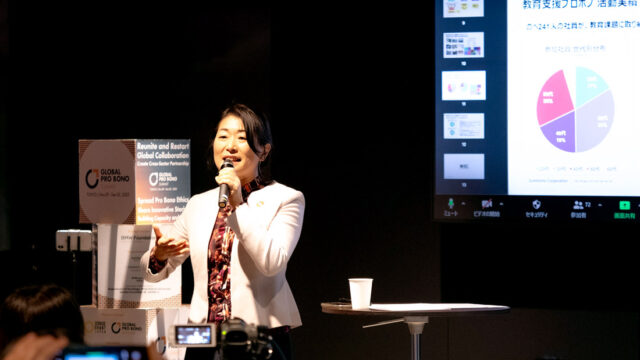
The Sumitomo Corporation Group has business bases in 78 countries and engages in a wide range of activities that support all aspects of our lives. 100SEED was launched on the occasion of the 100th anniversary of the company in 2019 to consider society 100 years into the future. Education was chosen as the theme and an employee-participatory social action programme was launched.
As of 2022, 53 projects have been launched in 19 countries.
In Japan, the organization promotes ‘Mirai School’, in which employees visit high schools across the country, ‘Education Support for a Multicultural Society’ and ‘Education Support Pro Bono’.
The three types of pro bono work undertaken so far are the ‘problem-solving’ type, which is undertaken in-depth over a period of three months, the ‘issue-organizing’ type, which is undertaken in one month, and the ‘plain-storming’ type, which is undertaken in three hours. Over the past three and a half years, a total of 240 employees have supported 34 organizations tackling educational issues.
The most common support needs in the ‘problem-solving’ category are the preparation of sales materials, marketing research and information dissemination. Around 90% of the clients we supported said they were ‘very satisfied’ with the service and also commented on specific results, such as ‘we were able to get a business contract using the sales materials’ and ‘we were able to create a sense of unity within the organization’. Meanwhile, around 70% of employees answered that it was “very good”. Some said they were unable to give their best due to time constraints, but others commented that it was stimulating to meet NPOs with a high sense of mission, that it gave them an opportunity to work with a renewed spirit, that it gave them confidence that they could help someone, that they rediscovered their strengths and that they found fulfillment in the experience.
Our aim in undertaking pro bono work is to contribute to society, but there is also a great deal to be gained by our employees through pro bono work, and we feel that the growth of our employees also strengthens our organization.
Case Study 2
Global pro bono development in a multinational company
Maria Carracedo / Pro Bono Lab, France
Andrea Sánchez Angulo / Work for Social, Spain
Shalabh Sahai / iVolunteer, India
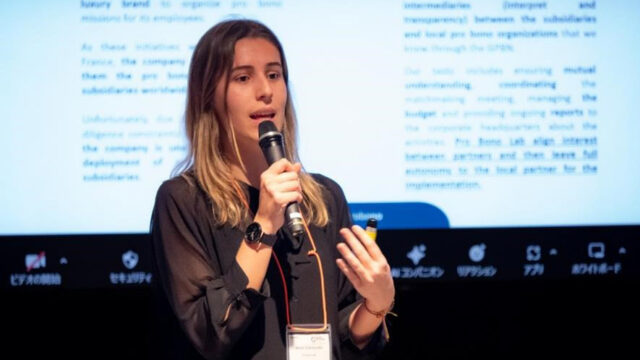
Pro Bono Lab participates in multinational companies’ pro bono activities in collaboration with intermediary organizations in other countries. As an example, we have worked with a global luxury brand company in France. After three years of pro bono work in France and having achieved a certain degree of success, the company approached us with a request to do pro bono work in their global locations as well. We had no track record and felt it would be difficult for us to do it alone, but this is where the Global Pro Bono Network came in handy and we were able to expand our activities to various locations, including Spain and India.
Starting with the matchmaking of the first pro bono project, operations such as reporting and budget management are undertaken by us. We also coordinate between the sites and the head office and ensure that the NPOs are provided with the support they need.
As a result, in the four years to date, 174 volunteers have implemented 52 different activities for 47 NPOs in 14 countries, together with 13 pro bono intermediary organizations.
First, three pilot programmes were implemented, starting in Spain. Each year the number of activities has increased and by 2023 there will be 13 activities. In India, we have been running the programme for three years, mainly in New Delhi, and the condition was that the shop employees would be involved. Simple activities that can be developed include activities to teach languages to children and to strengthen community links.
We have learnt a lot from promoting pro bono work with a company on an international level. The first is to start with a small pilot, but also to draw up a long-term strategy. Furthermore, we have to make sure that we have the resources, personnel and budget in the roadmap.
Within a company, it is crucial to have the support of the HR and communication departments. You also need to work flexibly with the head office. It is not always the case that the vision drawn up at the head office can be developed in the same way in other locations in other countries, so it is important to have a vision mission but to be open to developments that are rooted in the respective realities.
We feel that the structure, communication and learning that we have developed through this work, working together in a global pro bono network, is extremely important.
Case Study 3
Accelerating pro bono work in Chinese companies.
Li Jing / Beijing Pro Bono Foundation, China
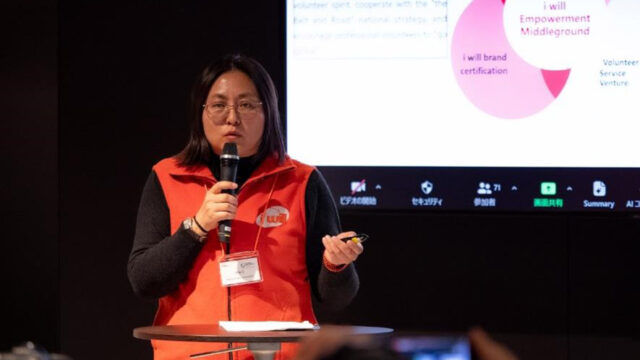
The Beijing Pro Bono Foundation was established in 2016 and works with NGOs, businesses and government agencies through pro bono.
Typical pro bono services in China include financial, legal and strategic consulting, but they are also changing as a tool for promoting volunteerism in different companies.
For example, pro bono work by individual companies has included the development of digital toolkits to solve social problems, data collection tools to increase the efficiency of NGOs’ activities, and the creation of platforms on the management of NGO and volunteer activities.
Some of the larger companies have also set up volunteer associations: in Byte Dance China, 29 volunteer groups worked as the ‘Pop Rock Charity’. In Tencent, a volunteer association has also been set up and during the pandemic, employees launched a health survey app.
As far as our involvement is concerned, for the Pop Rock Charity, we supported them in making rules regarding their activities. We also worked together on awareness-raising activities to combat fraud aiming the elderly.
And for the Tencent Volunteer Association, we are responsible for network management and capacity building for professional personnel. In addition, we also work with Huawei and Ericsson.
As companies volunteer to use their expertise, there are challenges they face in terms of environment, capacity and resources. However, we believe that intermediary organizations such as Pro Bono Foundation can help companies not only to create the social impact they want to bring about through their philanthropy, but also to see what economic value this can bring to them.
Case Study 4
Pro bono work by young, mid-career and executive-level employees in Indian companies.
Shalabh Sahai / iVolunteer, India
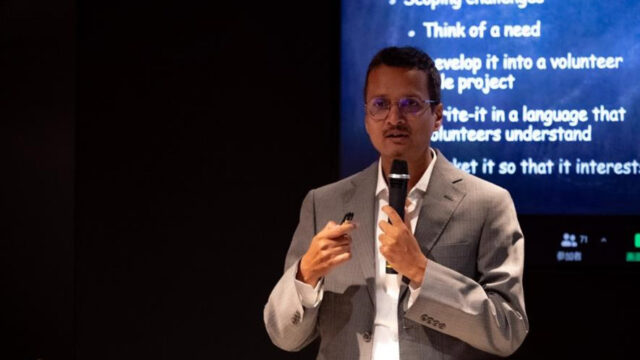
India is a very large and diverse country. This diversity is also extremely important for volunteering and pro bono activities. When implementing activities in a company, the first thing to do is to verify that they are fit for purpose – not only in terms of CSR, but also in terms of employee development. Then there are the needs and requirements on the NPO side, and what kind of activities are possible for volunteer personnel. It is difficult to fulfil all of these, but we are working on these topics in collaboration with a number of corporate partners and universities.
The most important thing for volunteer personnel is to understand the experiences of beneficiaries and raise awareness about the cause. The next step is to understand the significance, objectives and the NPO’s approach. Only when they have experience and knowledge of these can they move on to developing solutions. And it is through this kind of experience that you can become an evangelist.
We work with companies in three main areas: policy formulation, planning and promotion, and development of activities. flexibility is also important in corporate and pro bono work, as it is difficult to capture all aspects of an NPO’s situation from the outset. It is necessary to make adjustments while looking at the situation on a daily basis and devise ways to bridge the gap between the outcomes and the situation.
The journey of developing volunteer talent within a company is really a ‘journey’. Our approach is to start with simple tasks and then engage them in skills-based pro bono projects. They try a few smaller projects, and only after they have completed them do they develop into people who can work on longer-term pro bono projects, such as strategic proposals. In order to increase their commitment, we also allow them to spend time with beneficiaries and get a first-hand understanding of their needs before they start working with them.
As an example in the corporate sector, Nestlé asked its ‘Social Sabbaticals’ to take four weeks paid leave to work on a long-term, full-time project for a non-profit organization. Also, many Indian NPOs do not have a board or senior management. Therefore, in the ‘Whiteboard’ initiative, 8-12 corporate executives were put in charge of four NPOs and provided various advice as a board. After the Corona disaster, the project is still progressing virtually.
Volunteering is usually framed as a contribution to beneficiaries and the community, but it is also largely linked to opportunities for enlightenment and growth in the people actually involved in volunteering. Some companies have even found it effective in developing leadership skills. We hope that you will look at the benefits of volunteering from a variety of perspectives.




